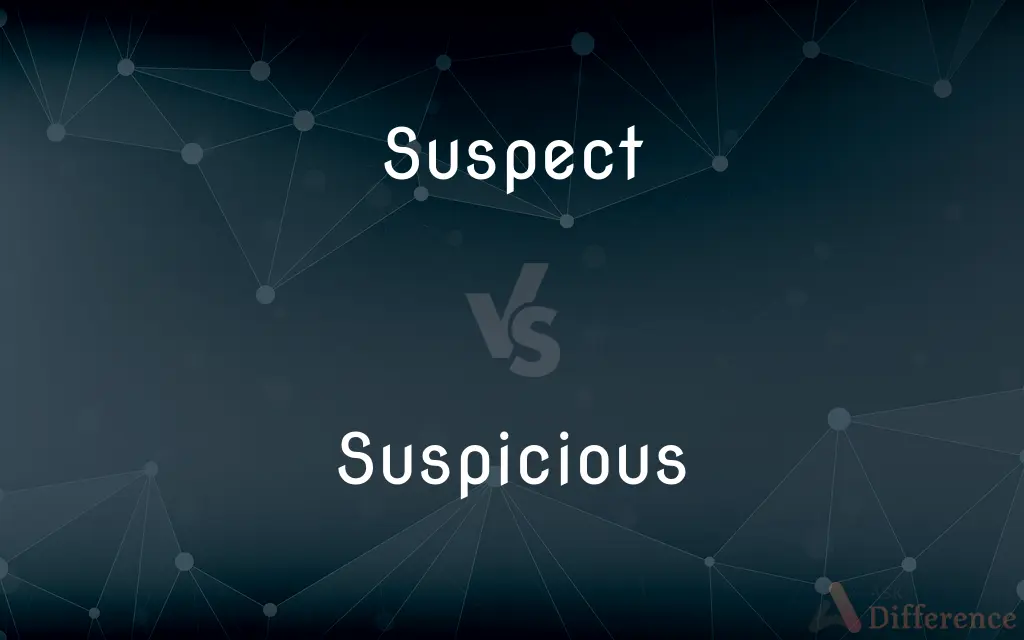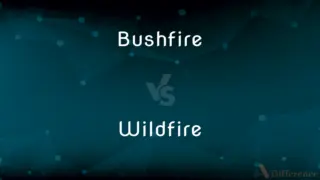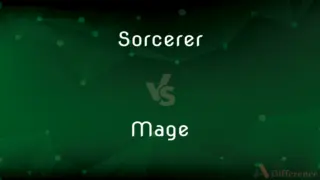Suspect vs. Suspicious — What's the Difference?
By Tayyaba Rehman — Updated on October 28, 2023
"Suspect" can be a noun referring to a person believed to have committed a crime or a verb meaning to doubt, while "Suspicious" is an adjective describing doubt or mistrust.

Difference Between Suspect and Suspicious
Table of Contents
ADVERTISEMENT
Key Differences
The word "Suspect," as a noun, refers to an individual believed to have been involved in an illicit activity, but not yet proven guilty. For instance, police might have a list of suspects related to a theft. On the other hand, "Suspicious" is primarily an adjective and relates to a feeling or appearance of mistrust or doubt. An unattended bag in a public place might be deemed suspicious.
In a different light, "Suspect" can also be used as a verb. To suspect someone means to have a feeling or notion that they may be involved in something, without concrete evidence. Conversely, the term "Suspicious" never acts as a verb but indicates a state of being, suggesting doubt or mistrust. A person might suspect their friend of taking their pen if it goes missing, especially if the friend has a history of borrowing items.
Furthermore, the contexts in which "Suspect" and "Suspicious" are used can vary. In legal contexts, a "Suspect" is often someone under investigation. "Suspicious," meanwhile, is more versatile in its usage and can relate to any situation, object, or person that arouses doubt. For instance, someone might find the taste of a drink suspicious if it doesn't taste as expected.
In essence, while both "Suspect" and "Suspicious" deal with doubt or mistrust, their applications and grammatical roles are distinct. One relates to specific people or the act of doubting, while the other describes a general feeling or appearance of doubt.
Comparison Chart
Part of Speech
Noun (person under suspicion) or Verb (to doubt)
Adjective (indicating doubt or mistrust)
ADVERTISEMENT
Example Usage
"He is a suspect in the crime." or "I suspect he knows the truth."
"She gave him a suspicious glance."
Contextual Role
Specific individuals or the act of doubting
Describes a feeling, appearance, or situation
Flexibility
Can refer to people or the act of doubting
Describes doubt or mistrust
Associated Actions
Being investigated, doubting
Being wary, doubting
Compare with Definitions
Suspect
To regard as likely or true without definitive evidence.
I suspect he knows more than he's letting on.
Suspicious
Having or showing a cautious distrust of someone or something.
He was suspicious of her motives.
Suspect
To have doubts or misgivings about.
She suspects his motives in offering help.
Suspicious
Inclined to suspect, especially inclined to suspect evil.
He has always been suspicious of strangers.
Suspect
A person believed to have committed a crime.
The detectives interviewed the main suspect.
Suspicious
Arousing or apt to arouse suspicion in others.
His behavior was highly suspicious.
Suspect
To imagine or think something to be possible.
I suspect there will be delays at the airport.
Suspicious
Having or showing a cautious distrust of someone or something
He was suspicious of her motives
She gave him a suspicious look
Suspect
In law enforcement jargon, a suspect is a known person accused or suspected of committing a crime. Police and reporters in the United States often use the word suspect as a jargon when referring to the perpetrator of the offense (perp in dated US slang).
Suspicious
Arousing or apt to arouse suspicion; questionable
Suspicious behavior.
Suspect
To consider (something) to be true or probable on little or no evidence
I suspect they are very disappointed.
Suspicious
Tending to suspect; distrustful
A suspicious nature.
Suspect
To have doubts about (something); distrust
I suspect his motives.
Suspicious
Expressing suspicion
A suspicious look.
Suspect
To consider (a person) guilty without proof
The police suspect her of murder.
Suspicious
Arousing suspicion.
His suspicious behaviour brought him to the attention of the police.
Suspect
To have suspicion.
Suspicious
Distrustful or tending to suspect.
I have a suspicious attitude to get-rich-quick schemes.
Suspect
One who is suspected, especially of having committed a crime.
Suspicious
Expressing suspicion
She gave me a suspicious look.
Suspect
Open to or viewed with suspicion
A suspect policy.
Suspect motives.
Suspicious
Inclined to suspect; given or prone to suspicion; apt to imagine without proof.
Nature itself, after it has done an injury, will ever be suspicious; and no man can love the person he suspects.
Many mischievous insects are daily at work to make men of merit suspicious of each other.
Suspect
(transitive) To imagine or suppose (something) to be true, or to exist, without proof.
To suspect the presence of disease
Suspicious
Indicating suspicion, mistrust, or fear.
We have a suspicious, fearful, constrained countenance.
Suspect
(transitive) To distrust or have doubts about (something or someone).
To suspect the truth of a story
Suspicious
Liable to suspicion; adapted to raise suspicion; giving reason to imagine ill; questionable; as, an author of suspicious innovations; suspicious circumstances.
I spy a black, suspicious, threatening could.
Suspect
(transitive) To believe (someone) to be guilty.
I suspect him of being the thief.
Suspicious
Openly distrustful and unwilling to confide
Suspect
(intransitive) To have suspicion.
Suspicious
Not as expected;
There was something fishy about the accident
Up to some funny business
Some definitely queer goings-on
A shady deal
Her motives were suspect
Suspicious behavior
Suspect
To look up to; to respect.
Suspicious
Causing one to have the idea or impression that something is questionable.
The meat had a suspicious smell.
Suspect
A person who is suspected of something, in particular of committing a crime.
Suspicious
Indicative of a lack of trust.
She cast a suspicious eye on his story.
Suspect
Viewed with suspicion; suspected.
Suspect
(nonstandard) Viewing with suspicion; suspecting.
Suspect
Suspicious; inspiring distrust.
Suspect [was] his face, suspect his word also.
Suspect
Suspected; distrusted.
What I can do or offer is suspect.
Suspect
Suspicion.
So with suspect, with fear and grief, dismayed.
Suspect
One who, or that which, is suspected; an object of suspicion; - formerly applied to persons and things; now, only to persons suspected of crime.
Suspect
To imagine to exist; to have a slight or vague opinion of the existence of, without proof, and often upon weak evidence or no evidence; to mistrust; to surmise; - commonly used regarding something unfavorable, hurtful, or wrong; as, to suspect the presence of disease.
Nothing makes a man suspect much, more than to know little; and therefore men should remedy suspicion by procuring to know more.
From her hand I could suspect no ill.
Suspect
To imagine to be guilty, upon slight evidence, or without proof; as, to suspect one of equivocation.
Suspect
To hold to be uncertain; to doubt; to mistrust; to distruct; as, to suspect the truth of a story.
Suspect
To look up to; to respect.
Suspect
To imagine guilt; to have a suspicion or suspicions; to be suspicious.
If I suspect without cause, why then make sport at me.
Suspect
Someone who is under suspicion
Suspect
A person or institution against whom an action is brought in a court of law; the person being sued or accused
Suspect
Imagine to be the case or true or probable;
I suspect he is a fugitive
I surmised that the butler did it
Suspect
Regard as untrustworthy; regard with suspicion; have no faith or confidence in
Suspect
Hold in suspicion; believe to be guilty;
The U.S. suspected Bin Laden as the mastermind behind the terrorist attacks
Suspect
Not as expected;
There was something fishy about the accident
Up to some funny business
Some definitely queer goings-on
A shady deal
Her motives were suspect
Suspicious behavior
Suspect
Regarded as not genuine or as being of dubious origin.
The authenticity of the painting is suspect.
Common Curiosities
What does "Suspicious" describe?
"Suspicious" describes a feeling or appearance of doubt or mistrust.
What part of speech is "Suspect" mainly used as?
"Suspect" can be used as both a noun and a verb.
Can "Suspect" refer to a person?
Yes, as a noun, "Suspect" refers to someone believed to have committed a crime.
If I believe someone might be lying, do I suspect or am I suspicious?
You suspect they might be lying, and you are suspicious of their statements.
Is "Suspect" always related to crimes?
No, it can be used in various contexts, not just criminal ones.
Can objects be described as "Suspicious"?
Yes, objects, situations, or behaviors can be described as suspicious.
Is "Suspicious" a verb?
No, "Suspicious" is an adjective.
If I have a doubt about something, which word should I use?
You would "suspect" something specific and be "suspicious" about a situation or individual.
Is "Suspicious" only used negatively?
While it often has a negative connotation, it just denotes doubt or wariness.
Can "Suspect" describe quality?
Yes, e.g., "The product's quality is suspect."
Which is more formal, "Suspect" or "Suspicious"?
Neither is inherently more formal; it depends on context.
Are the two words interchangeable?
No, they have distinct grammatical roles and meanings.
Can I describe a taste as "Suspect"?
It's more common to describe a taste as "suspicious," implying it's not as expected.
Which word would fit: "The ____ package left in the lobby"?
The "suspicious" package left in the lobby.
Can someone look "Suspect"?
Colloquially, yes. But it's more standard to say someone looks "suspicious."
Share Your Discovery

Previous Comparison
Bushfire vs. Wildfire
Next Comparison
Sorcerer vs. MageAuthor Spotlight
Written by
Tayyaba RehmanTayyaba Rehman is a distinguished writer, currently serving as a primary contributor to askdifference.com. As a researcher in semantics and etymology, Tayyaba's passion for the complexity of languages and their distinctions has found a perfect home on the platform. Tayyaba delves into the intricacies of language, distinguishing between commonly confused words and phrases, thereby providing clarity for readers worldwide.
















































